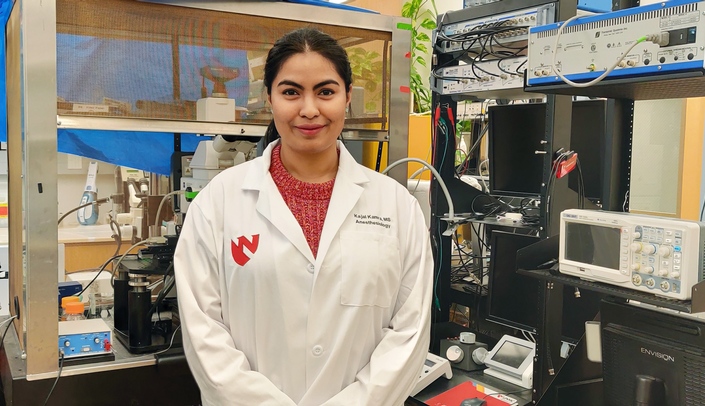Kajal Kamra, MS, recently received a predoctoral fellowship grant from the American Heart Association (AHA). The two-year grant, totaling $64,072, will go toward Kamra’s research to discover a novel role for pulmonary spinal afferents in regulating breathing after acute lung injury (ALI). Investigators say the research will pave the way for innovative, therapeutic approaches to treating cardiopulmonary diseases.
Kamra is a third-year doctoral candidate in the Integrative Physiology & Molecular Medicine (IPMM) program in the UNMC Department of Cellular & Integrative Physiology. She works in the laboratory of Hanjun Wang, MD, a research faculty member in the UNMC Department of Anesthesiology. Dr. Wang serves as the faculty mentor for the project, for which funding began on January 1, 2022.
Kamra’s award is the first AHA predoctoral fellowship to be awarded to a graduate-level researcher in the Department of Anesthesiology. Dr. Wang called the award a breakthrough in grant funding at the graduate trainee level. "Kajal’s award demonstrates that the department is an attractive choice for trainees pursuing a successful career in research science," he said.
In her research, Kamra cited preliminary data as a cause for investigation, saying that chemical stimulation of lung spinal afferents with the TRPV-1 positive C-fiber activator, bradykinin, increased respiratory rates in anesthetized, vagotomized rats. "Traditionally, the long-standing assumption is that the vagal-derived lung afferents are predominant in both cardiac and respiratory regulation, with the pulmonary spinal afferents playing minor roles," Kamra said. "Recent studies challenge this assumption and allude to the presence of spinal afferents in the lung."
Through the AHA-funded grant, Kamra’s research will:
· Discover how lung spinal afferents can be activated in respiratory regulation.
· Use integrative physiological strategies to determine how pulmonary spinal afferents can mediate ALI.
· Test whether pulmonary spinal afferent input induced by ALI is amplified by a pre-existing myocardial infarction, resulting in more severe respiratory dysfunction.
Since 1949, the AHA has invested more than $4.9 billion in research, making it the largest not-for-profit funding source for cardiovascular and cerebrovascular disease research next to the federal government. The AHA offers predoctoral fellowships to enhance the integrated research of outstanding predoctoral students or students enrolled in clinical health degree training programs who intend to pursue careers as scientists, physician-scientists, or related careers aimed at improving global health and wellbeing.
"Kajal is a fantastic graduate student with whom everyone would love to work," Dr. Wang said. "She is focused, independent, and a strong critical thinker. Since the first day of her PhD program, Kajal has engaged with scientific literature on a deep level. Her success is a natural consequence of her hard work, and I congratulate her on this well-deserved award."
Karsten Bartels, MD, PhD, and Vice Chair of Research in the UNMC Department of Anesthesiology, emphasized the grant’s significance. "AHA grants are at least as competitive as NIH grants to secure. Having strong and mutually beneficial mentoring relationships will grow the next generation of medical scientists, who will shape the future of anesthesiology," Dr. Bartels said. "Kajal’s AHA grant is a testament that mentee and mentor are on the right track. The Research Division could not be prouder of Kajal Kamra’s and Dr. Wang’s success."

Great achievement. Congratulations. I understand that you are looking into biochemical stimulation of concerned afferents through bradykinins. Is there a scope of physical stimulation through electrical/electronic signaling?
Wonderful News!